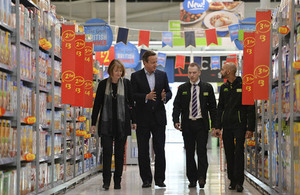PM: Family shopping bill could rise by £220 a year after a vote to leave (Archived)
The annual shopping bill of the average British family could go up by more than £220 after a vote to leave the European Union.

Prime Minister in Asda, Hayes with Harriet Harman and Asda staff.
- fall in sterling would increase the cost of everyday items
- average family of 4 could face extra costs of around £220 after 2 years
- analysis based on average of independent studies of the expected fall in the pound
New Treasury analysis shows that a fall in the value of sterling of more than 10%, caused by uncertainty after a vote to leave, would put upward pressure on the price of imports – after 2 years this would push up the annual costs of everyday items by more than £220 for a family of 4.
A range of independent studies have predicted a decline in sterling following a vote to leave the EU – with an average of a 12% fall in the value of the pound against other international currencies.
Today, using established economic modelling, the Treasury estimates that such a drop in the currency would, after 2 years, add around £220 to the annual cost of food, drink, clothing and footwear.
The Prime Minister David Cameron said:
This analysis makes absolutely clear that British families are better off remaining in a reformed European Union. Independent studies show that a vote to leave would hit the value of the pound, making imports more expensive and raising prices in the shops.
This isn’t about dry economics; this is about the economic security of hardworking families in Britain. Families are better off voting to remain in the EU – the alternative is a leap in the dark that would risk prosperity and security.
Asda President and Chief Executive Officer, Andy Clarke, said:
Asda has always been famous for its low prices and whatever the outcome of the referendum, we remain committed to that pledge.
But a vote to leave represents uncertainty, including on prices. That is why our position in this debate has been clear from the outset – Britain should remain within the EU.
Former Chief Executive of Waitrose Mark Price said:
As a former head of Waitrose, I know the retail sector inside and out. It’s clear that leaving the EU will see further pressure on the pound, which will mean higher prices for consumers.
While retailers make individual decisions on pricing in their stores, there is an established link between the sterling exchange rate and prices in shops.
This analysis does not include the potential added costs to families of higher tariffs that could be imposed on imported goods once the UK leaves the EU’s single market.
Notes to editors
The analysis conducted by the Treasury uses data on household expenditure published by the Office for National Statistics.
A range of independent economic studies have all projected a depreciation in sterling immediately following a vote to leave the European Union.
Read the analysis conducted by the Treasury.
The Treasury has taken the average of these estimated depreciations (12%) and used an established econometric model previously used by the Bank of Canada to model the impact on prices after 2 years.
Impact of 12% depreciation of sterling on shop of a 2 adult 2 child household:
| annual spend in 2014 (£) | annual spend 2 years after depreciation (£) | change (£) | percent change (%) | |
| food and drink | 4233 | 4355 | 123 | 2.9 |
| clothing and footwear | 1986 | 2085 | 98 | 5.0 |
| total | 6219 | 6440 | 221 | 3.6 |
Source: ONS Family Spending 2015
Note: totals may not sum due to rounding.